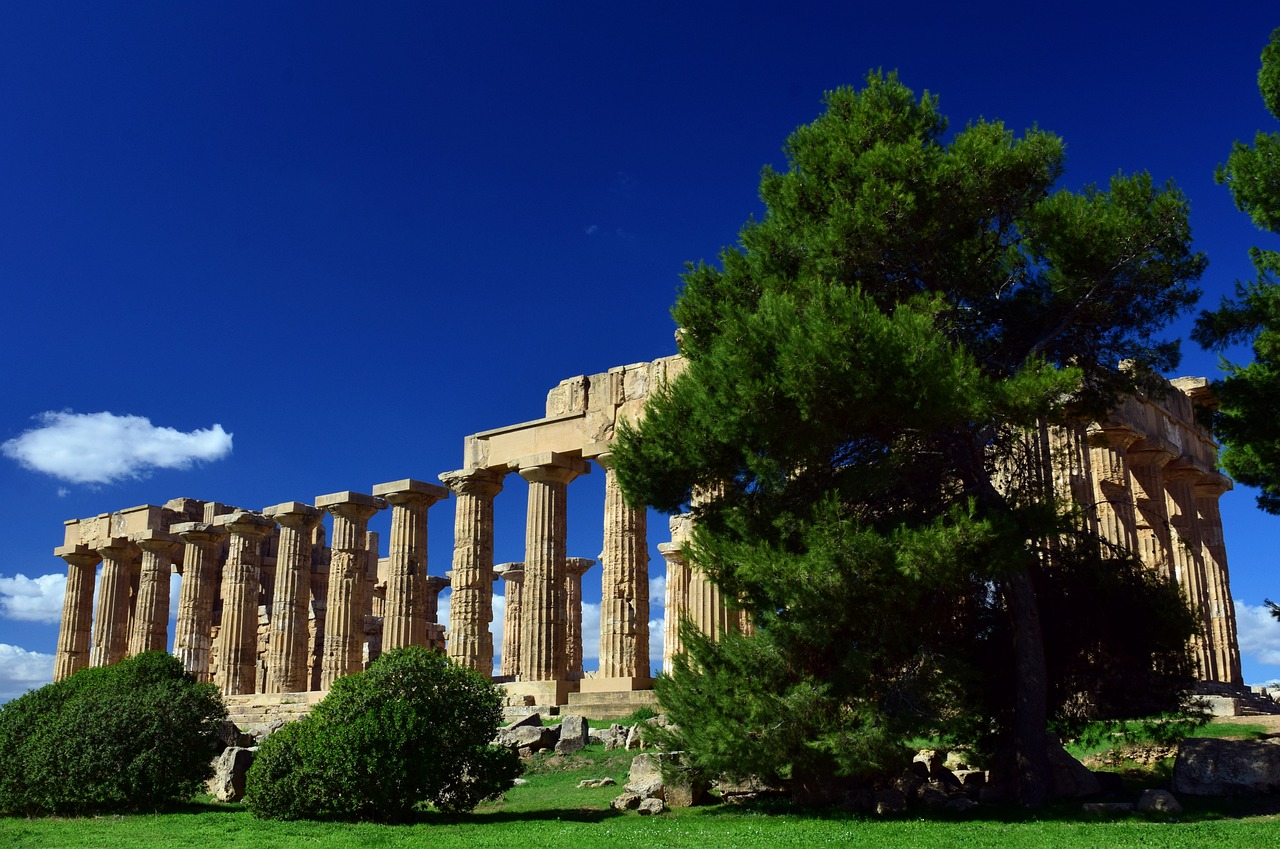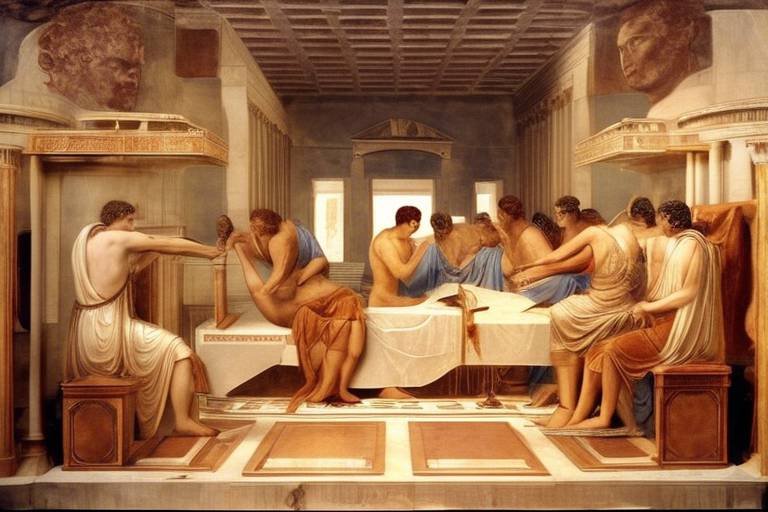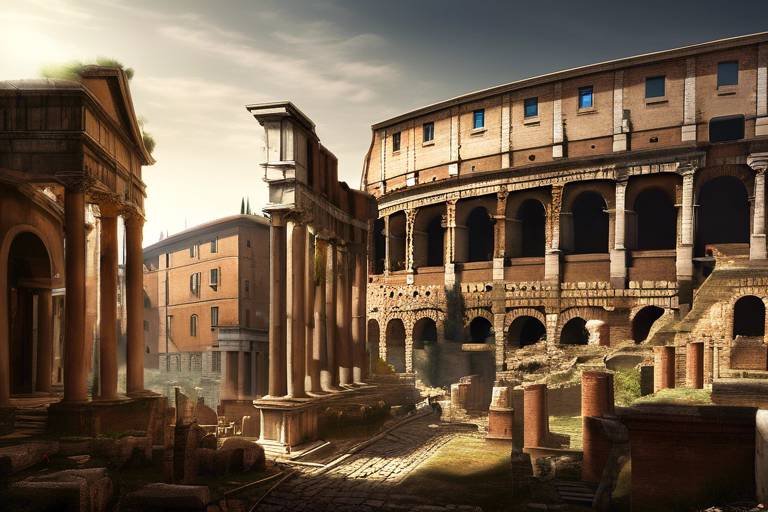The Legacy of Ancient Greek Science and Technology
Ancient Greek science and technology stand as the pillars of modern civilization, casting a long shadow of influence across the centuries. The intellectual prowess of ancient Greek scholars has left an indelible mark on various fields, ranging from philosophy and mathematics to astronomy and engineering. Their legacy continues to resonate in the intricate tapestry of contemporary society, shaping the way we perceive the world and innovate in the realm of science and technology.

Ancient Greek Philosophy
Exploring the enduring impact of ancient Greek advancements in science and technology on modern society, from philosophy and mathematics to engineering and astronomy.
Ancient Greek philosophy stands as a cornerstone of intellectual thought, with luminaries like Socrates, Plato, and Aristotle paving the way for contemporary philosophical discourse. Socrates, known for his Socratic method of questioning, challenged conventional beliefs and encouraged critical thinking. Plato, a student of Socrates, delved into metaphysics, ethics, and politics, shaping philosophical inquiry for centuries to come. Aristotle, in turn, made significant contributions to logic, metaphysics, and ethics, establishing a framework for Western philosophy.
The philosophical musings of these ancient thinkers continue to influence modern philosophical thought, with their emphasis on reason, ethics, and the pursuit of knowledge resonating across the ages. Their enduring legacy serves as a guiding light for those seeking to unravel the complexities of existence and morality.

Mathematical Contributions
Ancient Greek scholars made remarkable contributions to the field of mathematics, laying the foundation for the development of modern mathematical principles. Among these brilliant minds were Pythagoras, known for the famous Pythagorean theorem, which remains a fundamental concept in geometry. Euclid, another prominent mathematician, formulated the basic principles of geometry in his influential work "Elements," serving as a cornerstone for mathematical education for centuries to come. Archimedes, renowned for his innovative methods and discoveries, made significant contributions to the understanding of geometry and calculus, revolutionizing mathematical thought with his inventions and theories.

Astronomy and Cosmology
Exploring the enduring impact of ancient Greek advancements in science and technology on modern society, from philosophy and mathematics to engineering and astronomy.
The realm of ancient Greek astronomy and cosmology transports us back to a time when the heavens were a canvas of wonder and mystery. Pioneering minds like Ptolemy and Aristarchus gazed up at the night sky, contemplating the movements of celestial bodies and the structure of the universe.
Imagine standing alongside these ancient astronomers, peering through their primitive yet revolutionary instruments to chart the paths of the stars and planets. Their observations and calculations laid the groundwork for our modern understanding of the cosmos, influencing the very fabric of scientific thought.
One of the most notable contributions of ancient Greek astronomy was the geocentric model proposed by Ptolemy, which positioned Earth at the center of the universe with the Sun and planets orbiting around it. This model, though later replaced by the heliocentric system, was a significant step in unraveling the complexities of the cosmos.
In the field of cosmology, the Greeks pondered the nature of the universe itself, contemplating its origins and structure. Their philosophical inquiries into the fundamental principles governing the cosmos set the stage for centuries of scientific exploration and discovery.
Furthermore, the ancient Greeks were the first to propose the idea of a spherical Earth, a concept that revolutionized our understanding of geography and navigation. This insight not only transformed our perception of the world but also paved the way for future explorations and discoveries.
As we gaze up at the night sky, we are reminded of the enduring legacy of ancient Greek astronomers and cosmologists, whose curiosity and ingenuity continue to inspire us to explore the vast expanse of the universe.

Medical Knowledge and Practices
Ancient Greek civilization left a profound impact on the development of medical knowledge and practices, with notable contributions from renowned physicians like Hippocrates and Galen. These ancient healers laid the groundwork for modern medicine through their innovative approaches and keen observations of the human body.
Hippocrates, often referred to as the "Father of Medicine," revolutionized the field by emphasizing the importance of observation and clinical diagnosis. His famous Hippocratic Oath, a moral code for physicians, continues to influence medical ethics to this day. Galen, a prominent figure in Roman-era medicine, further expanded on Hippocrates' teachings and made significant advancements in anatomy and physiology.
One of the key principles of ancient Greek medicine was the concept of the four humors—blood, phlegm, yellow bile, and black bile—which were believed to govern a person's health and temperament. This holistic approach to healthcare focused on achieving a balance of these humors to maintain well-being.
Ancient Greek physicians also made notable progress in surgical techniques, pharmacology, and disease prevention. The practice of using natural remedies, such as herbs and plants, to treat various ailments was a common feature of their medical repertoire. Additionally, the establishment of medical schools and the dissemination of medical knowledge laid the foundation for the formal education of future generations of healers.
The enduring legacy of ancient Greek medical knowledge and practices can be seen in the modern healthcare system, where evidence-based medicine, clinical observation, and ethical standards remain fundamental principles. The holistic approach to health and the emphasis on preventive care espoused by Hippocrates and Galen continue to shape contemporary medical practices, highlighting the lasting impact of ancient Greek wisdom on the field of medicine.

Engineering and Architecture
Ancient Greek engineering and architecture stand as a testament to the ingenuity and creativity of this ancient civilization. The Greeks were pioneers in designing and constructing magnificent structures that continue to awe and inspire us today. One of the most iconic examples of their architectural prowess is the Parthenon, a temple dedicated to the goddess Athena, located on the Acropolis in Athens. The Parthenon's architectural design, with its columns and pediments, exemplifies the Doric style and showcases the Greeks' mastery of proportion and symmetry.
Moreover, ancient Greek engineers developed innovative building techniques that enabled them to create structures with remarkable durability and aesthetic appeal. They utilized materials such as limestone and marble, meticulously carved and fitted together to form intricate architectural details. The precision and craftsmanship evident in Greek architecture reflect their commitment to excellence and their pursuit of perfection in every aspect of construction.
Furthermore, the Greeks excelled in urban planning, laying out cities with a focus on functionality and aesthetics. The design of ancient Greek theaters, such as the Theater of Epidaurus, demonstrates their understanding of acoustics and sightlines, ensuring an immersive and engaging experience for audiences. These theaters were not only architectural marvels but also cultural hubs where dramatic performances and festivals celebrated the arts and honored the gods.
In addition to their architectural achievements, ancient Greek engineers made significant contributions to infrastructure development. They constructed aqueducts, bridges, and roads that facilitated trade and communication across the vast expanse of the Greek world. The innovative use of arches and vaults in their architectural projects showcased their engineering prowess and laid the foundation for future advancements in structural design.
The legacy of ancient Greek engineering and architecture continues to influence modern construction practices and inspire architects and engineers around the world. By studying the principles and techniques employed by the Greeks, contemporary designers can draw valuable insights into creating sustainable, functional, and aesthetically pleasing structures that stand the test of time.

Theater and Performing Arts
Ancient Greek theater and performing arts hold a significant place in the cultural tapestry of human history, influencing drama and performance to this day. The roots of Western theater can be traced back to the theatrical innovations of ancient Greece, where playwrights like Sophocles and Euripides crafted timeless tragedies and comedies that explored the depths of human emotion and experience.
The ancient Greeks introduced the concept of theatrical performances as a form of art and entertainment, staging elaborate productions in amphitheaters like the iconic Theater of Epidaurus. These performances were not merely spectacles but also served as platforms for social commentary, political critique, and philosophical exploration.
Theater in ancient Greece was a communal experience, bringing together people from all walks of life to witness the power of storytelling and performance. Actors wore masks to embody various characters, and the use of a chorus added depth and resonance to the narratives being presented.
Ancient Greek theater also gave rise to the concept of dramatic structure, with playwrights employing elements such as prologue, parodos, episodes, stasimon, and exodus to create compelling narratives that engaged audiences on intellectual, emotional, and spiritual levels.
The enduring legacy of ancient Greek theater and performing arts can be seen in the continued reverence for classical works, the adaptation of Greek tragedies and comedies into modern interpretations, and the ongoing exploration of universal themes and motifs that transcend time and culture.

Maritime Technology
Maritime technology in ancient Greece was a cornerstone of their civilization, enabling them to expand their influence across the Mediterranean and beyond. One of the most notable innovations was the development of the trireme warship, a formidable vessel equipped with three rows of oars that provided unparalleled speed and maneuverability in naval battles. These warships played a crucial role in the naval supremacy of ancient Greek city-states, allowing them to protect their interests and project power in the region.
Ancient Greek sailors were also pioneers in navigation techniques, using the stars, sun, and landmarks to chart their course across the seas. Their understanding of celestial bodies and their relationship to navigation laid the foundation for future advancements in maritime exploration. By mastering the art of navigation, ancient Greek sailors were able to undertake long voyages, establish trade routes, and foster cultural exchanges with distant lands.
The maritime technology of ancient Greece not only influenced their military strategy but also facilitated trade and cultural exchange. The development of advanced sailing techniques, such as the use of sails and rigging, allowed Greek merchants to conduct commerce with distant regions, exchanging goods, ideas, and knowledge. The interconnectedness fostered by maritime trade routes contributed to the spread of Greek culture and civilization throughout the ancient world.

Influence on Modern Science
Exploring the enduring impact of ancient Greek advancements in science and technology on modern society, from philosophy and mathematics to engineering and astronomy.
Ancient Greek science and technology have left an indelible mark on the development of modern scientific thought and technological innovations. The pioneering work of ancient Greek scholars continues to inspire and influence various fields of study in the contemporary world.
The foundational principles laid down by ancient Greek philosophers such as Socrates, Plato, and Aristotle form the basis of Western philosophical thought. Their emphasis on critical thinking, logic, and the pursuit of knowledge has deeply influenced modern scientific inquiry and reasoning.
Moreover, the mathematical contributions of ancient Greek scholars like Pythagoras, Euclid, and Archimedes have had a profound impact on the field of mathematics. Concepts such as the Pythagorean theorem, Euclidean geometry, and Archimedes' principles of buoyancy and levers are still fundamental to mathematical study and application today.
In the realm of astronomy and cosmology, the theories and observations made by ancient Greek astronomers like Ptolemy and Aristarchus laid the groundwork for our understanding of the universe. Their models of the solar system and the heliocentric theory have influenced modern astronomical research and exploration.
Ancient Greek medical knowledge and practices, as exemplified by physicians like Hippocrates and Galen, have shaped the foundations of modern medicine. The Hippocratic Oath, emphasizing ethical standards and patient care, continues to guide medical practitioners worldwide.
The engineering and architectural achievements of ancient Greece, including the construction of iconic structures like the Parthenon, showcase the innovative spirit and technical prowess of ancient Greek engineers. Their advancements in building techniques and design principles have influenced architectural practices throughout history.
Ancient Greek theater and performing arts, with renowned playwrights such as Sophocles and Euripides, have had a lasting impact on contemporary drama and storytelling. The dramatic conventions and narrative structures pioneered in ancient Greek theater continue to shape theatrical productions and literature today.
Furthermore, the maritime technology developed by ancient Greeks, such as the invention of the trireme warship and advancements in navigation methods, revolutionized seafaring and naval warfare. These innovations in maritime technology have influenced ship design and navigation strategies for centuries.
In conclusion, the enduring legacy of ancient Greek science and technology is evident in the continued influence and inspiration it provides to modern scientific endeavors. The discoveries and inventions of ancient Greek scholars continue to drive progress and innovation across a wide range of scientific disciplines, demonstrating the timeless relevance of their contributions.
Frequently Asked Questions
- What are some key contributions of ancient Greek philosophy?
Ancient Greek philosophy introduced foundational concepts in logic, ethics, and metaphysics. Philosophers like Socrates emphasized self-knowledge, Plato delved into ideal forms, and Aristotle pioneered systematic reasoning.
- How did ancient Greek mathematicians influence modern mathematics?
Ancient Greek mathematicians, such as Pythagoras with his theorem, Euclid with his axiomatic approach, and Archimedes with his contributions to geometry, laid the groundwork for modern mathematical principles and methodologies.
- What were some significant advancements in ancient Greek medicine?
Ancient Greek physicians like Hippocrates established the foundation of medical ethics and diagnosis, while Galen furthered anatomical knowledge. Their practices shaped the development of modern medicine.
- How did ancient Greek engineering influence architecture?
Ancient Greek engineers created innovative architectural designs, such as the use of columns and the development of the Doric, Ionic, and Corinthian orders. Their techniques influenced architectural styles for centuries.
- What role did ancient Greek theater play in shaping modern drama?
Ancient Greek theater, with playwrights like Sophocles and Euripides, introduced dramatic elements like tragedy and comedy. Their works laid the foundation for theatrical storytelling and character development.



















